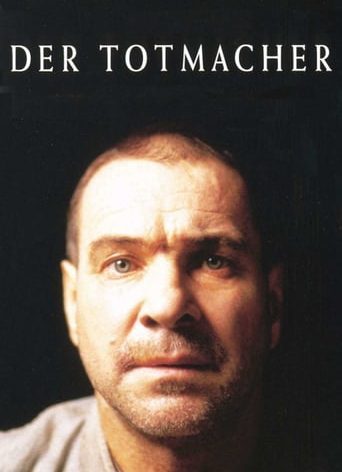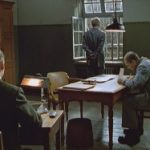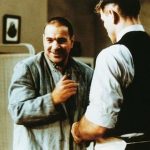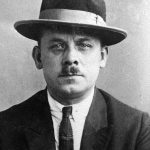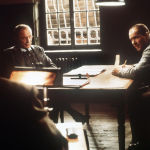The Deathmaker, 1995
The Deathmaker
Images
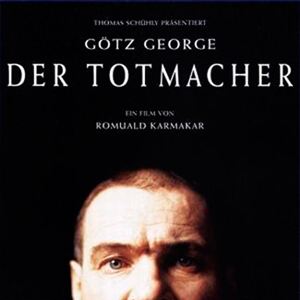
Based on real-life serial killer Fritz Haarmann, Der Totmacher entirely focuses on the psychological examination of the killer by Prof. Dr. Ernst Schultze, astutely played by actor Jürgen Hentsch.
The Professor is emphatic until he cannot be emphatic anymore, the composure of the Medical Profession and the professor’s neutral but stern questions become subconscious attacks on the killer as the good doctor learns more of the killers brutal, barbaric, egregious and demoniac acts of utter depravity. Harmann was known as the Vampire of Hanover for reason of biting off the jugular off his young victims (twenty seven in all), when foreplay began, and presumably ended right then.
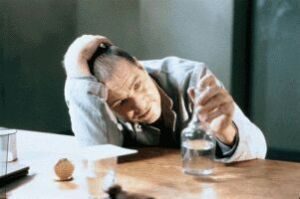
“Twenty One, fifty a hundred; it does not matter now. They will cut my head anyway. Tell them not to use a blunt object, I don’t want them to hurt me. I would like to meet my executioner.”

The good doctor Schultze keeps throwing the details of the crimes to Haarmann’s face as he grimaces, puts his head down, wonders what his dead mother would think, projects blame, describes his incestuous relations with his sister or sisters, a gentleman with whom he had slept as a child. And finally joins the doctor in detailing his MO, his unspeakable crimes in full.
“He fucked me from behind… but… but, I didn’t do it to him”
“Did you ‘suck’ him?”
“Yes and he took care of me.”
“You know that sodomy or ‘sucking’ is both punishable”
“Yes…”
“Did you like it”
“I told my sister I could not get an erection with women, she was angry.”
“Did you have ever have sex with a woman?”
“I had a fiance, I had sex with her, it was so good.”
We watch with cynicism as the camera encircles the interrogation table repeatedly as the two men talk; their expressions changing each time it comes full circle; to face (in passing) either of the two people.
The tension increases as both, the killer and the good doctor start to lose it by the end, which is still forty five minutes away.
The killer is being scrutinized to determine his sanity in a room at a the Göttingen Medical School.
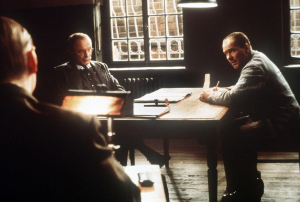
The entire 110 minutes of Der Totmacher have been shot in a brown and green room with high walls, a table, a few chairs, a barred window (only the good doctor and Harmann know what is outside). The director leaves us in the room, not letting us move from our seats, which has become of of the chairs in the placid room that is boiling with emotions of disgust, decapitations, human sausages fried in human fat and other atrocities being undertaken on the Dark Side of the Moon.
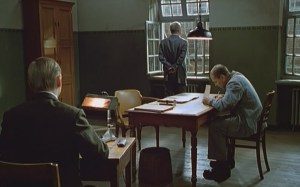
The room also has a stenographer (Pierre Franckh), as was the case in real life. The film is based on the transcript of the exchanges between Dr. Schultze and a manic and mocking Harmann.
The killer played by Götz George Tatort, 1970 does a super-quality job of projecting a deviant state of mind to the audience, his mannerism changing from being terrified of being executed; “I’ll tell my mother I died in the war”, and making advances towards the young stenographer. George as Harmann is highly effective in displaying disquieting trepidation and pure joy in equal quantity. That is until the questions become to hard to bear (or do they?) and Harmann approaches the doctor a second time to hug him. The first time he had tried, the good doctor’s finger pointing towards the chair had worked. Not this time, though.
“You’re NOT mad”
“I’m not crazy, I sent them away”
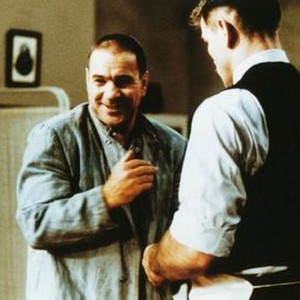
The film has the potential to scare more than a real-deal horror film; only if the keen viewer does not get lost in translation. For German speakers the film must’ve been a treat. I wish I could speak German and Disney.
With grand, imposing and magnificently sumptuous performances and a screenplay that tears through the heart and keeps going, Der Totmacher is a film about just one man among many who are driven to the depths of depravity and treachery and also start to like the taste of young blood – it is a film that does not show, but gains access in to the mind of one of the most evil men in history, for the audience to deliberate, in all the discomfort the dialogues have succeeded to manufacture.
Director Romuald Karmakar is clever, cruel and also gracious. He knows his close-up shots, he knows the perfect zoom-out as Harmann lifts his head laughing (minutes before he was shedding real tears). Karmakar manages to fill his film with dread and the contradiction of examining a convicted killer and trying very hard to determine his condition to face trial.
Watch closely as both men are at each others throats (Harmann is calm and delusional and scheming, the doctor is fuming at the ears); everything comes across as something that could actually have happened in the room at the hospital.
M, 1931 by Fritz Lang and Tenderness of the Wolves, 1973 is also based on the Butcher of Hanover. He sure did make an impression.
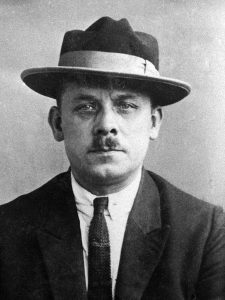
Fritz Haarmann at the time of his arrest on the 22nd of June, 1924
A must watch.

